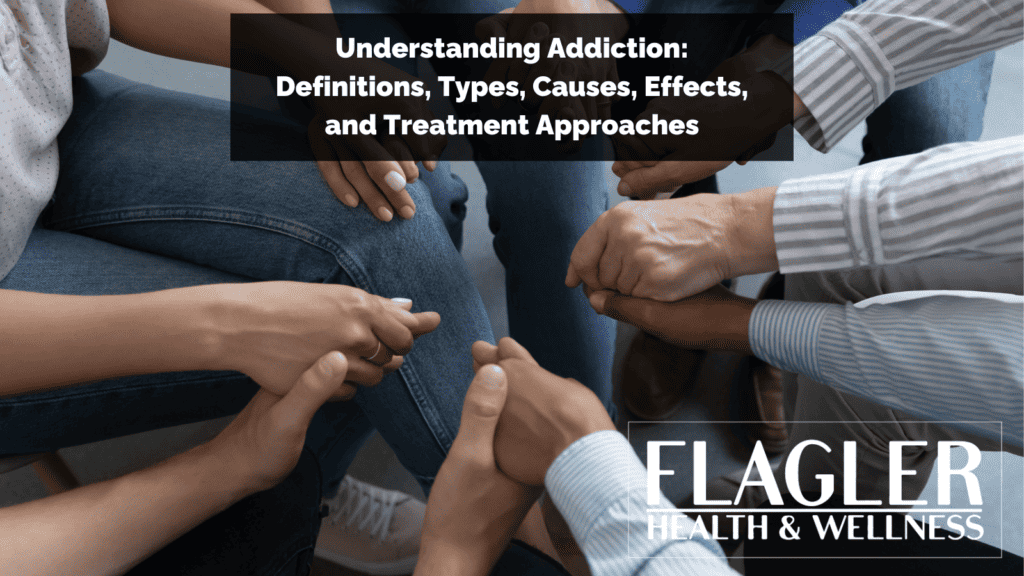Types of addiction are the different kinds or forms of addictive behaviors that an individual can engage in. They are classified into physical addiction and behavioral addiction.
Physical addiction involves physiological dependence on a substance, leading to withdrawal symptoms when its use is reduced or discontinued. Types of physical addiction include alcohol addiction, opioid addiction, nicotine addiction, and marijuana addiction.
Behavioral addiction involves compulsive engagement in a particular activity or behavior, despite negative consequences, similar to substance addiction. Types of behavioral addiction include gambling addiction, sex addiction, pornography addiction, and shopping addiction.
What is Physical Addictions?
Physical addictions are primarily associated with the compulsive use of substances such as drugs and alcohol that chemically alter the brain’s function and structure. This alteration results in the development of tolerance, where the individual requires increasingly larger amounts of the substance to achieve the same effect.
Types of physical addiction include alcohol addiction, opioid addiction, nicotine addiction, and marijuana addiction. Physical addiction are mainly caused by peer pressure, family problems, mental health problems, and trauma.
Substance-related Addictions
- Alcohol Addiction: A widespread issue, alcohol addiction is characterized by an uncontrollable urge to consume alcohol despite adverse consequences. Alcohol addiction affects both physical and mental health, leading to liver disease, cardiovascular problems, and psychiatric disorders. It also has profound social consequences, affecting relationships and professional obligations. Despite its legal status, alcohol’s addictive potential and the risks associated with excessive consumption make it a significant public health concern.
- Nicotine Addiction: Nicotine addiction is a physical and psychological dependence on tobacco products such as cigarettes. It is considered one of the most difficult addictions to break due to nicotine’s highly addictive nature. Users often experience withdrawal symptoms such as irritability, anxiety, difficulty concentrating, and increased appetite when trying to quit. Long-term misuse of tobacco products leads to serious health risks like lung cancer, heart disease, and stroke.
- Opioids Addiction: Opioid addiction encompasses a range of substances from prescription pain relievers like oxycodone and hydrocodone to illegal drugs such as heroin. Opioids bind to receptors in the brain and spinal cord, reducing pain and releasing large amounts of dopamine, leading to feelings of euphoria. Withdrawal symptoms can be severe, and opioid overdose poses a significant risk of death due to respiratory depression.
- Cocaine Addiction: A powerful stimulant drug, leading to intense short-term euphoria and, ultimately, addiction. Cocaine addiction tends to develop quickly, even after a few uses, leading to serious financial, social, and health consequences, including cardiovascular issues and neurological effects such as strokes. Cocaine users often go through binges, using the drug repeatedly within a short time to maintain their high, which can lead to overdose and death.
- Cannabis (Marijuana) Addiction: Regular, heavy use of cannabis can lead to dependence, characterized by tolerance and withdrawal symptoms such as irritability, sleep difficulties, and cravings. Although cannabis has therapeutic benefits including pain relief and anxiety reduction, its impact on mental health with prolonged use raises concerns about its addictive potential and the need for awareness and moderation in consumption.
- Benzodiazepines Addiction: Benzodiazepines are prescription medications commonly used to treat anxiety, insomnia, and seizures. Their sedative and muscle-relaxant properties can lead to psychological and physical dependence. Long-term use is associated with tolerance, meaning higher doses are required to achieve the same therapeutic effects, and withdrawal symptoms can be life-threatening.
- Stimulants Addiction: Prescription stimulants such as Adderall and Ritalin have a high potential for addiction when used improperly. These medications increase alertness, attention, and energy by boosting the levels of certain neurotransmitters in the brain. However, misuse for cognitive enhancement or recreational purposes can lead to dependency, cardiovascular issues, and psychological effects like paranoia. The challenge lies in balancing the legitimate medical need for these medications with the risk of abuse and addiction.
- Prescription Painkillers: Even non-opioid pain relievers such as acetaminophen can become addictive under certain conditions. While generally considered less addictive than opioids, prolonged use or misuse can result in dependency and, in some cases, significant side effects. This risk highlights the necessity for careful medication management, patient education on proper use, and the exploration of non-pharmacological pain relief methods to prevent addiction and ensure patient safety.
What is Behavioral Addictions?
Behavioral addiction, also known as process addiction, involves compulsive engagement in non-substance-related activities that provide immediate gratification despite potential long-term negative consequences.
Types of behavioral addiction include gambling addiction, shopping addiction, sex addiction, social media addiction and internet addiction. Behavioral addiction are caused by life stresses, mental health disorders, peer pressure, trauma, and social isolation.
Digital and Internet-Based Addictions
- Social Media Addiction: The compulsive use of social media platforms such as Instagram, Facebook, and TikTok can significantly impact mental health. Users may experience anxiety, depression, and loneliness as they constantly compare their lives to the idealized images presented online. The instant gratification from likes and shares can lead to an addictive cycle of seeking validation and attention, reducing in person interactions, and affecting self-esteem.
- Video Games Addiction: Video game addiction can lead to significant personal, social, and occupational impairment. This addiction is characterized by the inability to control gaming habits, leading to neglect of personal health, academic or career obligations, and significant relationships. The immersive nature of modern games can make quitting difficult, requiring professional help for some.
- Online Gambling Addiction: The digital evolution of gambling has made it more accessible, heightening the risk of addiction. Digital gambling environments offer the convenience of gambling from home, often without limits on time or money spent. The anonymity of online gambling can also make it more appealing but just as destructive, leading to financial problems, strained relationships, and mental health issues such as anxiety and depression.
- Cybersex and Pornography Addiction: Internet pornography and cybersex can develop into behavioral addictions, affecting relationships and personal well-being. This addiction involves compulsive behaviors around the consumption of online sexual content, leading to unrealistic sexual expectations, decreased satisfaction with real-life sexual relationships, and feelings of guilt or shame. It can significantly impact one’s social life and emotional health, requiring professional intervention for recovery.
- Gambling Addiction: Traditional gambling, including casinos, betting shops, and lotteries, continues to be a potent source of addiction. The thrill of the gamble, the hope of the big win, and the social environment can lead to a cycle of behavior that is difficult to break. The financial and emotional consequences can be devastating, including debt, relationship breakdowns, and mental health issues such as depression and anxiety.
- Shopping Addiction: Compulsive shopping or buying is a behavioral addiction characterized by an overwhelming urge to make purchases, often unnecessary, leading to financial strain and personal distress. This addiction is driven by a temporary emotional lift, followed by guilt, creating a vicious cycle. It can strain personal relationships and lead to severe financial problems, including debt and bankruptcy.
- Workaholism: Workaholism involves compulsive overworking to the detriment of personal relationships and health. Workaholics often prioritize work above all else, leading to stress, burnout, and physical health issues like heart disease. The underlying motivation can be rooted in perfectionism, the need for control, or avoidance of personal issues, necessitating a holistic approach to treatment.
- Exercise: Exercise addiction is characterized by a fixation on exercise routines and distress if one is unable to work out, often leading to injuries, social isolation, and interference with daily responsibilities. While exercise is beneficial for physical and mental health, it can become harmful when done in excess. The pursuit of a certain body image or the endorphin rush from exercise can drive this behavior.
- Eating Disorders: Though primarily classified as mental health disorders, eating disorders such as bulimia and anorexia can have addictive components related to control and body image.The compulsive nature of eating, restricting, or purging behaviors shares similarities with substance addiction, including cycles of binging and withdrawal, and requires comprehensive treatment addressing both the psychological and physical aspects of the disorder.
- Sex and Love Addiction: These involve compulsive behaviors in pursuit of romantic or sexual experiences, often leading to personal and relational turmoil. Individuals may engage in risky sexual behavior, become overly dependent on the emotional validation from relationships, or remain in unhealthy relationships out of fear of being alone. These patterns can lead to emotional distress and require targeted therapy to address underlying issues and promote healthier relationship patterns.
Emerging Types of Addictions
Emerging addictions encompass a range of novel behavioral and substance use patterns that have gained prevalence in recent years, reflecting changes in technology, societal norms, and the availability of new psychoactive substances. These addictions often involve activities or substances that were not previously recognized for their addictive potential, such as excessive use of digital media, vaping, and engagement with cryptocurrencies.
The introduction of new psychoactive substances, including synthetic cannabinoids and other designer drugs, pose significant challenges for public health systems. Recognized by entities like the World Health Organization and the National Institute on Drug Abuse, these emerging addictions share commonalities with traditional addictions, including the development of tolerance, withdrawal symptoms upon cessation, and a significant impact on daily functioning. Addressing these new challenges requires updated research, public health strategies, and clinical approaches to prevent and treat these evolving forms of addiction effectively.
Novel Substance Addictions
- Synthetic Cannabinoids: Synthetic cannabinoids such as Spice and K2 are designed to mimic THC, the active ingredient in marijuana. These drugs can cause unpredictable and severe health effects such as acute psychosis, severe anxiety, increased heart rate, and even death. Their legal ambiguity and accessibility contribute to their use, making them particularly dangerous substances with a high potential for addiction.
- New Psychoactive Substances (NPS): NPS include a broad category of synthetic drugs designed to mimic traditional drugs like cocaine, ecstasy, and cannabis. These substances often evade drug laws by slightly altering chemical structures, leading to unknown health risks and potential for addiction.
- Vaping and E-cigarettes: Initially marketed as safer alternatives to smoking, they have led to new forms of nicotine addiction, especially among younger demographics who were previously non-smokers. The convenience, flavored options, and perceived lower health risks contribute to their appeal, potentially leading users to develop long-term nicotine dependencies.
Evolving Behavioral Addictions
- Extreme Sports and Risk-Taking Behaviors: Extreme sports such as base jumping and other risk taking behaviors can become addictive. Participants often seek the natural high and euphoria associated with the resulting adrenaline rush, leading to increased risk-taking to achieve the desired emotional and physiological states. This addiction can result in neglect of personal safety and well-being.
- Cosmetic Surgery Addiction: Cosmetic surgery addiction is characterized by an obsession with achieving an ideal body image, leading individuals to undergo repeated surgeries despite negative consequences. This obsession often stems from body dysmorphic disorder (BDD) and can result in significant physical, emotional, and financial strain as the pursuit of unattainable perfection becomes compulsive.
- Tattoo and Body Modification Addiction: The compulsive need to alter one’s appearance through tattoos and body modifications can become an addictive behavior for some. This form of addiction is often driven by a desire for self-expression or to belong to a particular community. However, it can escalate to the point where individuals prioritize modifications over their health and financial stability.
- Hoarding: Hoarding is the compulsive accumulation of items, regardless of their actual value or utility. This behavior can create unsafe living conditions, strain relationships, and lead to significant emotional distress. Often rooted in anxiety or traumatic experiences, hoarding can be challenging to treat due to the emotional attachment individuals develop with their possessions.
- Reality Television and Celebrity Worship: An obsessive investment in the lives of celebrities and reality TV narratives can lead to behavioral addiction, where individuals become so engrossed in these virtual relationships and stories that they neglect their real-life interests, relationships, and well-being. This addiction can impact mental health, leading to feelings of inadequacy and disconnection from reality.
- Internet Challenges and Viral Dares: The compulsion to participate in internet challenges and viral dares for social media recognition has become a concerning form of behavioral addiction. These activities often involve risky behaviors, driven by the desire for online fame or acceptance within social media communities, posing significant risks to physical health and safety.
- Cryptocurrency Trading and Investment: The volatile world of cryptocurrency trading and investment can lead to compulsive behaviors, where the thrill of the gamble and potential for high returns drives individuals to obsessively monitor and trade digital currencies. This addiction can lead to financial instability, anxiety, and significant personal and professional consequences.
- Environmental Destruction:A compulsion to engage in behaviors that harm the environment, such as arson, reflects a destructive form of addiction. This urge to destroy, often driven by deep-seated emotional issues, can lead to severe legal and social repercussions, highlighting the need for psychological intervention.
- Virtual Reality (VR) and Augmented Reality (AR) Overuse: Excessive use of VR and AR technologies can disconnect individuals from reality, leading to a preference for virtual over real-life experiences. This form of addiction can affect social relationships, physical health, and overall well-being, as users increasingly retreat into digital worlds at the expense of their real-world interactions and responsibilities.
How We Can Help You
The landscape of addiction is vast and varied, spanning from the tangible effects of substance abuse to the intangible grip of digital compulsion. No matter what challenge you are facing, recognizing the need for help is the first step on the road to recovery. The second is to find the right treatment program for your needs.
At Flagler, we offer specialized programs that are tailored to an individual’s needs, ensuring the highest chance of your success. Remember, seeking help is not a sign of weakness, but rather one of strength and self-awareness. Reach out to us today to see how we can help you on your journey to a brighter, substance-free future.
Share This Post







